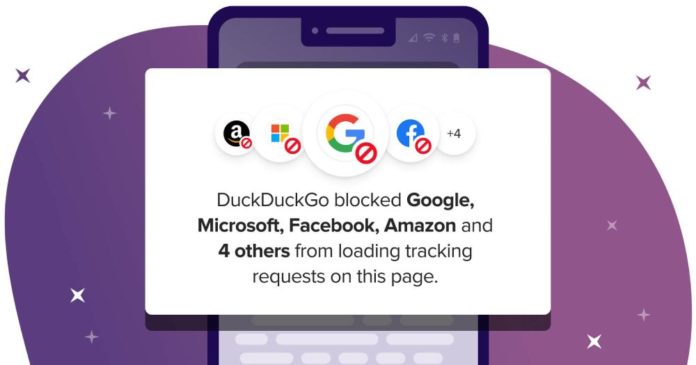
DuckDuckGo is expanding the third-party tracking scripts it blocks from loading on websites to include scripts from Microsoft in DuckDuckGo browsing apps (iOS and Android) and its browser extensions (Chrome, Firefox, Safari, Edge and Opera) — with beta apps to follow in the coming month. This expands the company’s 3rd-Party Tracker Loading Protection, which blocks identified tracking scripts from Facebook, Google, and other companies from loading on third-party websites, to now include third-party Microsoft tracking scripts. This web tracking protection is not offered by most other popular browsers by default and sits on top of many other DuckDuckGo protections.
How does it work?
Many websites embed scripts from other companies (i.e. “third-party scripts”) that automatically load when you visit their site. For example, most websites use Google Analytics, which helps site owners understand how their sites are being used. But Google can also use this information to profile you outside of the site where the information originated. Most browsers’ default tracking protection focuses on the cookie and fingerprinting protections that only restrict third-party tracking scripts after they load in your browser. That level of protection, however, leaves information like your IP address and other identifiers sent with loading requests vulnerable to profiling. DuckDuckGo’s 3rd-Party Tracker Loading Protection helps address this vulnerability by stopping most 3rd-party trackers from loading in the first place, providing significantly more protection.
Previously, DuckDuckGo was limited in how it could apply for the 3rd-Party Tracker Loading Protection on Microsoft tracking scripts due to a policy requirement related to the use of Bing as a source for its private search results. This is no longer the case and so, DuckDuckGo decided to implement this additional protection to its apps and browser extensions.
Nevertheless, DuckDuckGo never embedded Microsoft scripts in its search engine or apps. Other websites may do it, though. And now, if you’re a DuckDuckGo user, you are protected against Microsoft’s scripts, as well.
Actually, DuckDuckGo is already restricting Microsoft tracking through its other web tracking protections, like blocking Microsoft’s third-party cookies in browsers; this update goes one step above that — making DuckDuckGo’s apps the true champ in this arena, as it now blocks more trackers than most other browsers.
DuckDuckGo works with Microsoft on ads
It is important to note that advertising on DuckDuckGo is done in partnership with Microsoft. However, viewing ads on DuckDuckGo is anonymous, and Microsoft has committed not to profile its users on ad clicks: “when you click on a Microsoft-provided ad that appears on DuckDuckGo, Microsoft Advertising does not associate your ad-click behavior with a user profile. It also does not store or share that information other than for accounting purposes.”
Advertisers who want to know how or whether their ads are working (converting) can see that within Microsoft Advertising, relying on Microsoft scripts from the bat.bing.com domain. Currently, if an advertiser wants to detect conversions for their own ads that are shown on DuckDuckGo, 3rd-Party Tracker Loading Protection will not block bat.bing.com requests from loading on the advertiser’s website following DuckDuckGo ad clicks, but these requests are blocked in all other contexts. For anyone who wants to avoid this, it’s possible to disable ads in DuckDuckGo search settings.
DuckDuckGo has started working on architecture for private ad conversions that can be externally validated as non-profiling. Other entities are also trying to solve this issue; for instance, Safari is working on Private Click Measurement (PCM) and Firefox is working on Interoperable Private Attribution (IPA). Efforts like these should help move the entire digital ad industry forward to making privacy the default.
More transparency
DuckDuckGo’s browser extensions and non-beta apps are already open-source, as is its Tracker Radar — the data set of trackers and other third-party web activity DuckDuckGo identifies through crawling. The company now also made its tracker protection list publicly available, so folks can see for themselves what DuckDuckGo is blocking and report any issues.
The Privacy Dashboard within DuckDuckGo apps and extensions has also been updated to show more information about third-party requests. Using the updated Privacy Dashboard, users can see which third-party requests have been blocked from loading and which other third-party requests have loaded, with reasons for both when available.
Finally, there is a new help page offering a comprehensive explanation of all the web tracking protections DuckDuckGo provides across platforms. Users now have one place to look if they want to understand the different kinds of web privacy protections DuckDuckGo offers on the platforms they use. This page also explains how different web tracking protections are offered based on what is technically possible on each platform, as well as what’s in development for this part of our product roadmap.
The bottom line
The DuckDuckGo announcement ends with a commitment for the long haul to make simple privacy protection available to all. We like how that sounds and advise everyone to use their service instead of Google. And also a VPN for an added layer of protection.
